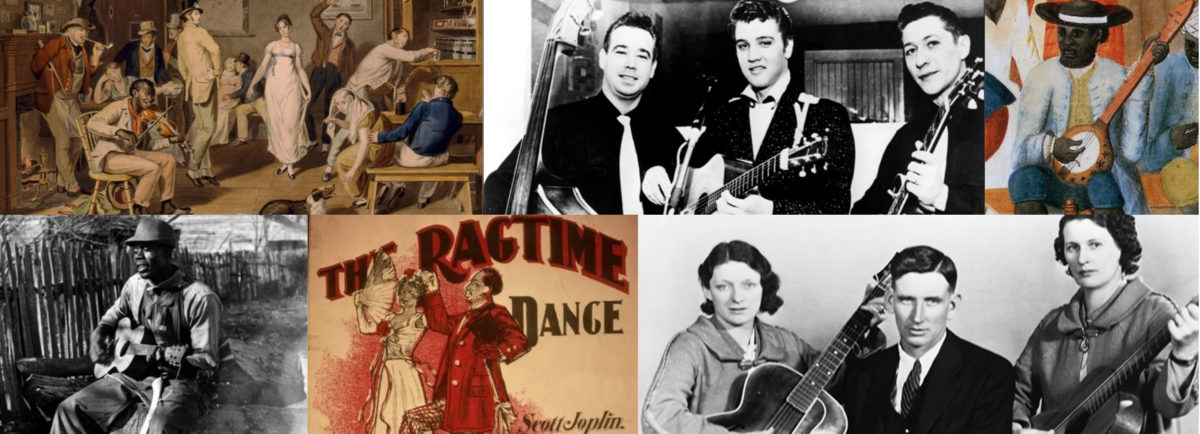Audio Investigation Slide
The Battleship of Maine: Audio Investigation Slide
-
- Click the link above to launch the slide deck (2 slides).
- Invite students to respond to the following questions shown on slide #1:
-
- What are some reasons that one country might declare war on another country? List as many as you can think of.
- What are some reasons that citizens might enlist in the military when their country goes to war? List as many as you can think of.
-
- Advance to slide #2.
- Click the media player in the bottom right corner of the slide to begin audio playback of the song.
- Invite students to respond to the following questions shown on the slide:
-
- Based on the lyrics, why did the soldier in the song decide to enlist?
- What do you think happened to the Battleship Maine?
- Why do you think that the soldier does not want to fight?
-
- Students will probably guess that the Battleship Maine was attacked or sunk, and infer that this was what led to a declaration of war and the request for volunteers that is mentioned in the lyrics. Share the details of the explosion with them, including the reasons the ship was docked in Havana harbor, the conflicting findings of the initial and subsequent investigations into the cause of the blast that sank the U.S.S. Maine, as well as the immediate reports of the yellow press that blamed Spain before any inquiry had begun. If yellow journalism is not already a vocabulary term that students know, provide a definition and some examples from this period. Clarify though, that while the sensationalized news reports and the perception that Spain had caused the destruction of an American battleship had some influence on public opinion, historians generally agree that it was not a factor in Congress’ decision to declare war on Spain.
Recommendations
This song is useful in introducing a unit on imperialism or a lesson on the Spanish-American War.
After students share their responses to the second set of questions and you provide the additional information and any clarification necessary, you can ask them whether the reasons they listed for countries going to war and for citizens volunteering to fight are reflected in the lyrics. Reviewing the reasons they identified and comparing them with the story as told in the song can create a foundation for explaining the concept of vital national interests and the role it plays in determining a nation’s foreign policy as a prelude to discussing the United States’ emergence as an imperialist world power in the late 19th and early 20th centuries. Content to cover as it pertains to the conditions in this period includes the shift to a more industrially-based economy, the desire for cheap, abundant raw materials, protection of existing economic interests abroad, cementing hemispheric dominance, and expanding influence as a world power. This will enable students to see the big picture more clearly and to distinguish between the public’s perception of the immediate causes of the war and the underlying causes that drove McKinley’s actions in his negotiations with Spain for Cuba’s independence and Congress’ ultimate decision directly. Additionally, encourage students to think about the imperialist period in terms of the continuity and change over time in American foreign policy that it reflects.
Public perception of foreign and domestic affairs, as well as of the motives and actions of their government, is important nonetheless and warrants attention when covering this period, and the lyrics provide an opportunity to explore the significance of those perceptions more closely. In the song, the soldier enlists in response to the president’s request for volunteers and expresses hope that he will be honored for his efforts after the war’s end. This suggests a sense of patriotism and duty, as well as belief in the righteousness of the country’s cause, both of which, likely, were part of students’ responses. (You may find it helpful here to ask students to define patriotism and, if necessary, help them to refine the definition, as it will be useful as you proceed through the unit to contrast patriotism with nationalism.) At the same time, the soldier’s unwillingness to fight, his inclination to flee, and the repetition of the “Battleship of Maine” as the cause of the war contradict those initial ideas. This is an opportunity for students to use what they have learned about the United States’ vital national interests to consider and discuss what this contradiction might imply about the perceptions of both the public and soldiers about the righteousness of the ostensible cause and the underlying causes of the war. This can set the stage for future lessons about the annexation of Hawaii, the acquisition of Puerto Rico and Guam, and the Philippine-American War, as well as pro- and anti-imperialist public sentiment.
Vocabulary
U.S.S. Maine – U.S. Battleship sent to Havana harbor to protect U.S. interests during Cuban War of Independence; exploded while docked in the harbor; rumors that the explosion was caused by Spanish military helped spark Spanish-American War
McKinley - William McKinley, 25th President of the United States; attempted to negotiate with Spain for Cuban independence
Rough Riders – nickname of 1st U.S. Volunteer Cavalry Regiment, one of 3 conceived of by TR, supposed to be composed of “frontiersmen” from Arizona, New Mexico, Texas, and Oklahoma, but also ended up including more affluent individuals from eastern Ivy League schools as well
brogans – inexpensive work-boot issued by the military to soldiers
Additional Resources
Primary Source Strategies
Printable worksheets with response prompts that guide students in analyzing songs as primary sources.

